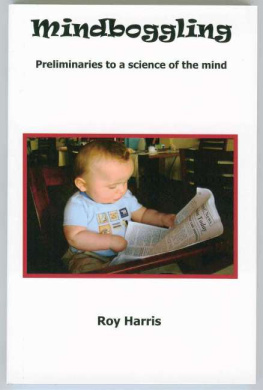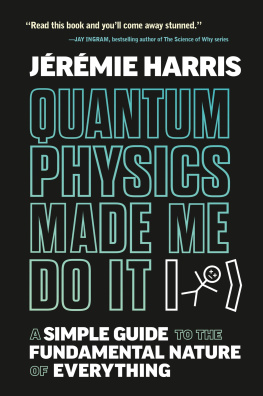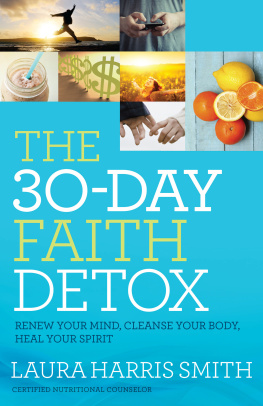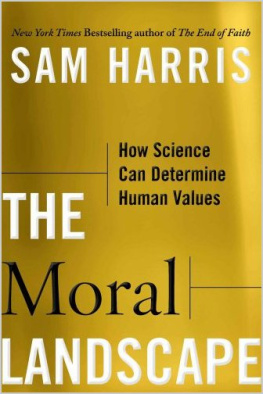Roy Harris - Mindboggling: Preliminaries to a science of the mind
Here you can read online Roy Harris - Mindboggling: Preliminaries to a science of the mind full text of the book (entire story) in english for free. Download pdf and epub, get meaning, cover and reviews about this ebook. year: 2011, publisher: The Pantaneto Press, genre: Religion. Description of the work, (preface) as well as reviews are available. Best literature library LitArk.com created for fans of good reading and offers a wide selection of genres:
Romance novel
Science fiction
Adventure
Detective
Science
History
Home and family
Prose
Art
Politics
Computer
Non-fiction
Religion
Business
Children
Humor
Choose a favorite category and find really read worthwhile books. Enjoy immersion in the world of imagination, feel the emotions of the characters or learn something new for yourself, make an fascinating discovery.
- Book:Mindboggling: Preliminaries to a science of the mind
- Author:
- Publisher:The Pantaneto Press
- Genre:
- Year:2011
- Rating:5 / 5
- Favourites:Add to favourites
- Your mark:
- 100
- 1
- 2
- 3
- 4
- 5
Mindboggling: Preliminaries to a science of the mind: summary, description and annotation
We offer to read an annotation, description, summary or preface (depends on what the author of the book "Mindboggling: Preliminaries to a science of the mind" wrote himself). If you haven't found the necessary information about the book — write in the comments, we will try to find it.
Roy Harris: author's other books
Who wrote Mindboggling: Preliminaries to a science of the mind? Find out the surname, the name of the author of the book and a list of all author's works by series.
Mindboggling: Preliminaries to a science of the mind — read online for free the complete book (whole text) full work
Below is the text of the book, divided by pages. System saving the place of the last page read, allows you to conveniently read the book "Mindboggling: Preliminaries to a science of the mind" online for free, without having to search again every time where you left off. Put a bookmark, and you can go to the page where you finished reading at any time.
Font size:
Interval:
Bookmark:
MINDBOGGLING
Preliminaries to a science of the mind
Roy Harris
The Pantaneto Press 2011
All rights reserved. No part of this publication may be reproduced or transmitted in any form or by any means electronic or mechanical including photocopying, recording on any information retrieval system without permission in writing from the copyright owners.
Published by The Pantaneto Press, First Floor, 3 Gordon Street , Luton, Bedfordshire , LU1 2QP, UK
ISBN 978-0-9549780-3-7
The Pantaneto Forum
Founded in 2000, The Pantaneto Forum is a quarterly web-based journal, which aims to promote debate on how scientists communicate, with particular emphasis on how such communication can be improved through education and a better philosophical understanding of science.
www.pantaneto.co.uk
Contents
Preface
Chapter 1 The vulgar mind
Chapter 2 The ghostly mind
Chapter 3 The well-behaved mind
Chapter 4 The other mind
Chapter 5 The wilful mind
Chapter 6 The computerized mind
Chapter 7 The encoding mind
Chapter 8 The silent mind
Chapter 9 The linguistic mind
Chapter 10 The mind demythologized
Chapter 11 The mind located
Chapter 12 The self-evident mind
Chapter 13 The verbalized mind
Chapter 14 The unconscious mind
Chapter 15 The conscious mind
Chapter 16 The self-conscious mind
Chapter 17 The extraordinary mind
Chapter 18 The tidy mind
Chapter 19 The integrated mind
Chapter 20 The cosmic mind
Chapter 21 The collective mind
Chapter 22 The primitive mind
Chapter 23 The relative mind
Chapter 24 The mind defined?
Chapter 25 The mind reinstated
Chapter 26 The mind reported
Chapter 27 My mind
References
Preface
You may think that Do you have a mind? is either a badly formulated question or else an insult to your intelligence. This book sets out to convince you that it is neither, by presenting some of the main arguments for and against the existence of minds. These are arguments that need to be dealt with before there can be any question of constructing a science of the mind (or, for that matter, of the brain, or of both).
Do you have a mind? may sound to some scientists like a question that only philosophers are likely to ask. There is some truth in this. But this book is not a potted history of philosophy of mind, nor of psychology. However, it raises certain issues that are basic to both enterprises, and especially to the question of whether the human mind falls within the province of the natural sciences at all.
Anyone who asks Do you have a mind? invites the facile answer: It all depends on what you mean by mind . But this is not a purely verbal question, and cannot be settled any way you like just by opting for whatever definition you prefer. I shall try to show why not.
Another reaction that I confidently anticipate is: it is absurd to write a book on this subject, because anyone who can write (or read) a book (on anything) must by definition have a mind. But, I shall maintain, although having a mind is inextricably bound up in various ways with having a language, it is simplistic to treat the latter as evidence for the former.
In setting out my case I shall try to avoid technical terminology as far as possible. This is not because my aim is to present a dumbed-down version of the issues for the benefit of scientists with no background in psychology or philosophy or linguistics, but because I believe that in many cases the technical terminology has actually served to obscure or confuse those issues. When I have occasion to discuss the claims of various authorities, I shall give exact references and verbatim quotations, in preference to reliance on paraphrasing their pronouncements. In order to avoid any suspicion of rigging the evidence, when a passage needs to be translated from some language other than English, I shall cite other peoples translations, in preference to supplying my own. Although I comment on many views about the mind, and list a large number of bibliographical references at the end, I have not attempted to give an introduction even to the basic reading on the subject: that would have required far more space than I have allowed myself.
I do not disguise my own views about the mind, but I try not to insist on them. The aim is to enable readers to see clearly where they disagree with me and where they dont. I make no attempt to present an impartial account of these issues. What I say is part of an intellectual autobiography, reflecting my own digestion of and reactions to ideas about the mind that I have encountered. My excuse for this autobiographical approach is that it is more honest than any attempt at impartiality. Unlike Galileo before the Inquisition, I am not obliged to pretend that conflicting opinions are equally worthy of respect, or that there is an ultimate truth of the matter laid down in Holy Writ (or the modern equivalent about to be revealed in the scriptures of Science).
There is, of course, an argument of my own about the mind that I want to put forward, and I would not have written this book otherwise. But I think the book can be read with profit even if you come to the conclusion that my argument fails to convince you, and that a science of the mind can go ahead without me.
Each chapter deals with one particular boggle about the mind. I try in each case to explain how it arises and what to make of it. In the end, Do I have a mind? is a question that individuals must answer for themselves. My main concern is to distinguish between silly and sensible ways of understanding the question, and to explain why it is a question worth taking seriously. My own answer will be found in the final chapter.
R.H.
Oxford , January 2008
Chapter One
The vulgar mind
Do you have a mind? is a question with a long history. Ignore that history and you risk losing some valuable answers. But paying too much attention to the past would risk being led astray, because the history of the question is both confused and confusing.
Where, then, can one start? I propose to start from the question itself as presented here, Do you have a mind? : that is, a question formulated in English and addressed to readers whose acquaintance with English is sufficient to enable them to grasp the relevant vocabulary and syntax. If you have no such acquaintance, I assume you would not be reading this book anyway. However, even if you have, that does not necessarily mean you understand what the question asks. To clarify that issue is precisely what this book attempts to do.
Asking Do you have a mind? sounds at first as if it were a parallel question to Do you have a body? and, because of the parallel, philosophers have spent a great deal of effort on what they call the mind/body problem. For reasons I shall come back to, I think that much of this effort has been a waste of time. But I mention it at the outset to sound a cautionary note.
Where did you get the idea that you even might have a mind? I suggest it came from one or both of two sources. One is whatever you might happen to have read about the mind. But even if you have never read anything on the subject, there remains the other source, which I will call for convenience vulgar mindspeak.
I call it vulgar mindspeak because it is the kind of language that serves what an Oxford philosopher once called our vulgar concept of mind (Hampshire 1971: 20). By this I think he meant whatever concept of mind seems prima facie to underlie saying such things as He thinks that the government has broken its election pledges or She has a very curious idea of racial discrimination. Here the words thinks and idea are words that belong to the kind of vocabulary I would customarily use for everyday purposes in discussing my own beliefs and those of others. Along with it goes saying such things as the following. 1. When decisions are called for, one must make up ones mind. 2. Things not to be forgotten or overlooked must be borne in mind. 3. When we revise an opinion, we change our mind. 4. When there is a difficult task to be done or a problem to be solved, one puts ones mind to it. 5. Two people in complete agreement are of the same mind.
Font size:
Interval:
Bookmark:
Similar books «Mindboggling: Preliminaries to a science of the mind»
Look at similar books to Mindboggling: Preliminaries to a science of the mind. We have selected literature similar in name and meaning in the hope of providing readers with more options to find new, interesting, not yet read works.
Discussion, reviews of the book Mindboggling: Preliminaries to a science of the mind and just readers' own opinions. Leave your comments, write what you think about the work, its meaning or the main characters. Specify what exactly you liked and what you didn't like, and why you think so.













